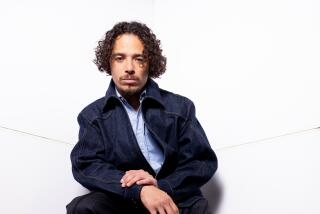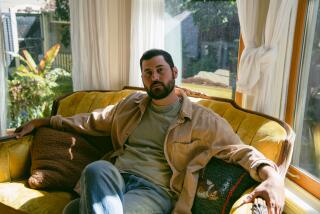Watershed
- Share via
“You remember in Norman Maclean’s ‘Young Men and Fire’ when he says that the young firefighters [soon to die in a forest fire] didn’t know they owed the universe a tragedy?
“I felt that way until I cut my leg.”
This is Sebastian Junger talking. He was working in suburban New York taking down trees from the top, piece by piece, with a chain saw. One day he forgot to bring his leather boots, so he was up in a tree in tennis shoes. He made a mistaken move and with his saw sliced open his lower left leg to--but not through--his Achilles’ tendon. That set him reflecting on men who work at dangerous jobs.
One thing led to another and now Junger, 35, is on a national tour promoting “The Perfect Storm,” his finely written, terrifying tale of an awesomely powerful storm that struck the Northeast in October 1991 and took the lives of six men aboard a Gloucester, Mass., swordfishing boat that sank without a signal, leaving only some deck gear to float to shore.
Published in May, his book is on bestseller lists around the country; it is No. 3 on the L.A. Times nonfiction list. It has been chosen as a dual selection for the Book-of-the-Month Club. He sold the movie rights to Warner Bros. for $150,000, with another $350,000 to come if the movie gets made, and the paperback rights to HarperCollins for $1.2 million.
The publicity makes him look tough, gritty, macho. One story, by a friend, said he drinks a lot of bourbon and doesn’t know what underwear is. (That’s largely true. “I’ve got to rub him out,” Junger says. “He’s spoiling my carefully constructed media image.”) Some photographs show his wiry body shirtless, sailing his new sloop, swimming at Cape Cod. As the author of an action book, the striking-looking Junger is a publicist’s dream.
But the man is more congenial than the image.
On a recent visit to Los Angeles, Junger (pronounced Younger) smiled and talked modestly about his work and himself. He was wearing high black shoes, neat dark blue jeans, a dark open-neck shirt and an off-white sport jacket. He has hazel-blue eyes and a tall brush cut. Sometimes, he wears a small gold earring.
The phone in his West Los Angeles hotel room was ringing. “It’s been like this all summer,” he said apologetically. “I was so happy before all this. I hope it doesn’t somehow change things.
“This is way more than I expected or even wanted. Finally, in my 30s, I made enough to live on by writing for magazines”--including Outside, American Heritage and Men’s Journal.
As an example of what he doesn’t like about his new station in life, he tells about hitchhiking a ride between Woods Hole and Hyannis on Cape Cod to save his publisher, W.W. Norton & Co., $45 for a taxi. His publisher chewed him out, and his publicist leaked the story to the Boston Globe. “I don’t want to turn into the kind of person so that it’s extraordinary that I have to hitchhike,” he said.
Junger got his love of outdoor life from a boyhood spent partly on Cape Cod and his vocation as a writer from the experience of writing a senior honors thesis in cultural anthropology at Wesleyan University in Connecticut.
He is by ancestry Italian, Spanish, Russian and Austrian, in equal parts. His father, Miguel, lived the World War II years in Cascais, a little fishing village and now a big resort, on Portugal’s Atlantic coast. Later in America, as a physicist specializing in underwater acoustics, Miguel returned to the edge of the sea and built a house in Truro, Mass., where Sebastian and his younger sister spent much time. Sebastian dedicated the book to his father, “who first introduced me to the sea.”
The Cape “is a place that shaped me more than anything else,” he said. He surfed in the Atlantic long before it was popular there.
*
College got him going into what he has been doing since. He said that he was an indifferent student, doing well in what he was interested in, not so well otherwise. He was a good long-distance runner, and he got the idea to write a thesis about the long-distance Navajo runners. Like the runners of Africa and the Tarahumara Indians of Mexico, the Navajo running tradition, he said, goes back to the days before the horse, when the only speed was human.
“I would train with these guys outside Window Rock, Ariz. They would call on supernatural powers, like the ones they would call on for hunting and fighting. . . . The kids were wearing Nikes and nylons [shorts and singlets] and red paint dabbed on their cheeks. I was just on fire writing that thing. I would race back after dinner and work on it.”
Junger got a degree with honors from it, and he was captivated by journalism. He has written about smoke-jumpers, reported from Bosnia for radio, ridden tugboats in the Mississippi.
He was living in Gloucester, still limping from his leg wound, when he watched 30-foot waves from the great nor’easter crash against the shore. He clipped the story from the paper about the loss of the 72-foot Andrea Gail, struggling against immense seas, and decided to write a book about men in dangerous jobs. It became the book about the storm.
“The Perfect Storm” describes the convergence of several weather systems to produce a storm that can scarcely be imagined. Junger writes sympathetically and in great detail about the lives of the crewmen and their families. Based on careful research, he tells what it is like to drown trapped in a sinking steel boat. He writes of other marine emergencies in that storm, and brave and frightening rescue attempts at sea by the Air National Guard.
The book has been widely and warmly praised, but not universally. A writer for the New York Observer recently published an article critical of Junger for errors. Irritated and hurt, Junger responded somewhat sheepishly that yes, he had erroneously put spark plugs in a diesel engine and had mixed up some Gloucester streets, but he defended both his characterization of the boat and his less-than-enthusiastic portrait of its owner.
Most important to him, the families of the lost men like the book. So does the Coast Guard, which has invited Junger to lecture and is going to teach the book in several courses at the U.S. Coast Guard Academy in New London, Conn.--all the incoming freshmen will read it, as will seniors in honors English and students of meteorology.
“All the graduates will either go to sea or become helicopter pilots,” said Jordon Pecile, head of the English section of the department of humanities. So Pecile said the “beautifully written” book nicely fits the category of “literature as leadership.”
*
Junger said that though he has some ideas for books, he is going to return to writing magazine stories. And continue cutting trees, though this time not for the money. “As my life approached what looked like a vertical takeoff,” he said, “I wanted to keep my life real.” So once a week or so he puts on his climbing gear and goes up.
“Up there, the only thing that matters is that I don’t make mistakes, that I don’t hurt either myself or the tree.”
Junger said he doesn’t think he’ll move from his modest apartment in the East Village in Manhattan. He has a girlfriend but doesn’t live with her. With his new money, he bought a heavy 26-foot English fiberglass sloop, which he keeps at Provincetown, Mass., at the tip of Cape Cod.
Is there anything else one should know? Well, one more tale from the storyteller.
When Junger was 6 months old, he had the Boston Strangler as a baby sitter for a time. Albert DeSalvo, who was later caught and charged with the rape and murder of 13 women, worked in construction. The Junger family hired him to do some work in their house in Belmont, outside Boston. The family liked him.
One day DeSalvo came to work looking nervous and white-faced. A friend called Sebastian’s mother, Ellen, and said that the Strangler had struck again and was thought to be in Belmont. Junger’s mother locked all the doors and told DeSalvo the news as he was up on a ladder. She reported that he looked perturbed.
More to Read
Sign up for our Book Club newsletter
Get the latest news, events and more from the Los Angeles Times Book Club, and help us get L.A. reading and talking.
You may occasionally receive promotional content from the Los Angeles Times.







